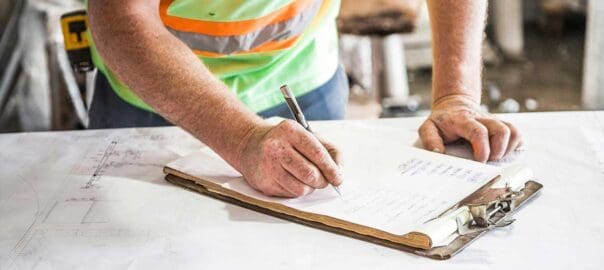Picture this: You’ve just completed a long-awaited home improvement project. Your roof is looking sharp, and weather-resistant, and you feel like you’re finally in the clear. Storms can cause significant damage, so it’s important to have a licensed roof inspector assess your roof. But wait—did you know that a roof certification letter could save you hundreds of dollars on your home insurance premiums? What necessary repairs might be needed after a storm? That’s right, and your roof could be the golden ticket to securing a better rate with your insurance provider after necessary repairs are made.
In this blog post, we’re diving deep into the world of roof certifications—what they are, why they’re so important for home insurance, and how you can easily get your hands on one from a reputable roofing company. We’ll also walk you through some common mistakes homeowners make when certifying their roofs, so you can avoid costly headaches down the road. Let’s get started!
What Is a Roof Certification Letter and Why Does It Matter for Insurance?
A roof certification letter is essentially a formal document that verifies the condition and age of your roof, which is crucial for any insurance claim you may need to file. It’s an official statement that your roof is in good shape and free from any damage that could affect your home’s safety or the longevity of the roofing materials. Think of it as a clean bill of health for your roof—a stamp of approval from a professional roofing contractor that gives insurance companies confidence in the protection your roof provides.
Why is this important for homeowner’s insurance? Insurance companies need to know that your roof is in good condition and will protect your home in the event of a storm or other natural disasters. Without a roof certification letter, an insurance company may either charge higher premiums, require you to make repairs, or even deny coverage altogether. Insurance companies are risk-averse, so they want to ensure that your roof is up to code and won’t result in costly claims in the future. A roof certification letter proves that your roof can handle the elements, which may help lower your insurance premiums and reduce the risk of future claims.

How to Obtain a Roof Certification
Now that we’ve established why a roof certification letter is so important let’s talk about how to actually get one. Here’s a step-by-step guide:
1. Find a Certified Roofing Professional
The first step is to hire a certified roofing contractor to assess the condition of your roof and do a professional roof inspection by a trusted roofing company to avoid issues with your home insurance. Make sure the contractor is licensed and insured, as most insurance companies will only accept certifications from qualified professionals. Many contractors, like us here at Denny’s Roofing, offer roof certifications as part of their services.
2. Schedule a Roof Inspection
Once you’ve found the right contractor, schedule a time for them to come out and inspect your roof. During the inspection, the contractor will check for a variety of factors, including:
- Roof age: How old is your roof? Insurance companies are mainly concerned with roofs that are 15 years old or older, as they may need repairs or roof replacement soon.
- Condition of the materials: Are there any missing shingles, damaged tiles, or signs of wear and tear?
- Structural integrity: Is your roof still securely attached to the home, or are there areas of weakness?
- Signs of leaks or water damage: Any evidence of previous water intrusion can be a red flag for insurance companies.
3. Receive Your Roof Certification Letter from a licensed roof inspector to help with your insurance claim.
If the contractor determines that your roof is in good condition and can adequately protect your home, they will issue a roof certification letter. This letter will include details about your roof’s condition, the materials’ age, and the roof’s estimated lifespan moving forward. It will also confirm that your roof is up to code and has no significant issues that would compromise its performance.
4. Submit the Certification to Your Insurance Firm
Once you have the certification letter in hand, it’s time to submit it to your insurance company. Be sure to send them all the necessary documentation, including the contractor’s details and any other information they may request. If your roof is in good shape, your insurer may lower your premiums or offer you a discount for having a certified, well-maintained roof. It’s a win-win on most insurance policies!

Common Mistakes Homeowners Make When Certifying Their Roofs
While getting a roof certification letter is reasonably straightforward, homeowners make some common mistakes along the way. Let’s review a few of them to avoid making these missteps yourself.
1. Not Choosing the Right Contractor can lead to damaged shingles and unnecessary repairs.
One of the most common mistakes homeowners make is hiring a non-certified or licensed contractor. It’s essential to choose a contractor who is recognized by insurance and has experience in roof certifications. A certified contractor ensures that your roof gets the proper inspection and that your insurer will accept the certification letter.
2. Delaying Roof Repairs
If your roof has minor damage, like a few missing shingles or a small leak, you might be tempted to ignore it or put off repairs. However, this could be a huge mistake regarding getting your roof certified. Insurers are highly sensitive to damage, and even small issues can make it difficult to get certified. If your contractor identifies issues during the inspection, it’s better to fix them before requesting a certification. A certified roof should be in excellent condition.
3. Assuming Certification Is Only About Age
While the age of your roof is an important factor in a roof certification, it’s not the only consideration. Even a relatively young roof can have issues that prevent certification if it’s not properly maintained. For example, if your roof has missing shingles, curling edges, or visible wear, it may not pass the inspection—regardless of how old it is. Always make sure that the roof is well-maintained, and don’t just assume that age alone will determine eligibility for certification.
4. Ignoring Roof Maintenance
Even after your roof has been certified by a licensed roof inspector, it’s essential to continue regular roof maintenance. Roofs are constantly exposed to the elements, and they can quickly fall into disrepair without proper care. Regular inspections, cleaning gutters, and addressing minor issues can ensure that your roof remains in top shape for years to come. If you let maintenance slide, it could hurt your chances of getting another certification in the future—or worse, it could result in higher insurance premiums.
5. Not Following Up with the Insurance Provider
Once you’ve received your roof certification, don’t forget to follow up with your insurance underwriter. Sometimes, they might lose the paperwork or request additional documentation for the repairs needed. Always keep a copy of your roof certification letter and stay on top of the submission process to ensure that you’re getting the discounts or premium reductions you deserve.
Why Roof Certifications Are Worth It
In conclusion, getting a roof certification is not just a wise decision—it’s a necessary step for homeowners looking to protect their property and ensure peace of mind. By providing your roof is in top condition and getting it certified, you can lower your premiums, increase your property value, and ensure your home is protected in the event of a storm or natural disaster.
So, if you haven’t yet gotten a roof certification letter, now is the time to do it. Contact a licensed roofing company to get your roof certified by a qualified roofing professional and start the process today—you might just be surprised by how much you can save!
At Denny’s Roofing, we make the certification process easy and stress-free, so call or shoot us an email, and let’s get your roof certified for your peace of mind!

